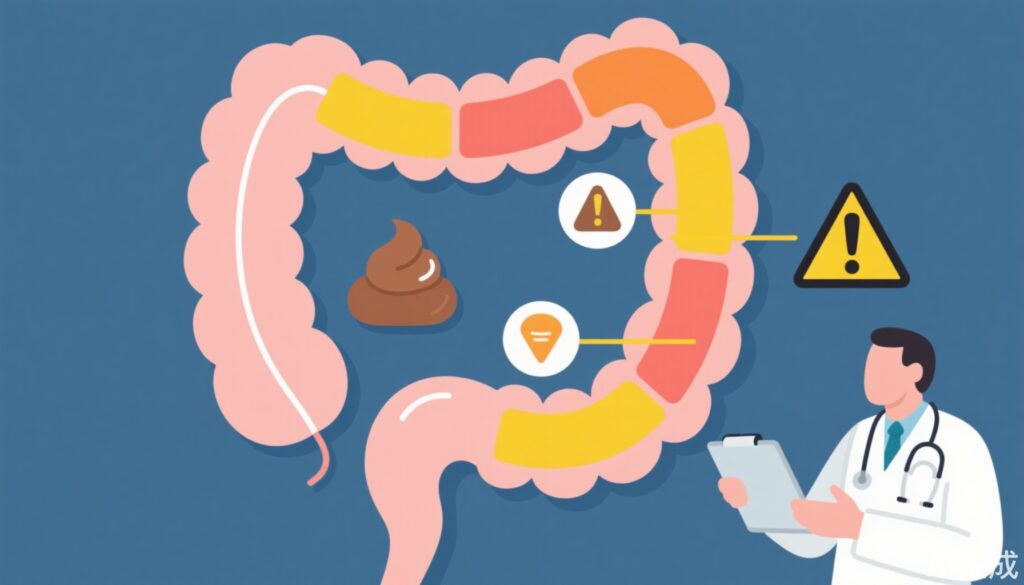Overview
Colorectal cancer (cancer of the colon or rectum) is often diagnosed at a later stage, yet when detected early the five‑year survival rate can exceed 90%. In advanced stages, survival falls dramatically (around the low teens percent for stage IV). Many people miss early warning signs because everyday bowel symptoms—diarrhea, constipation, abdominal discomfort—seem common. Recognizing persistent or new changes in bowel habits and stool can lead to earlier diagnosis and better outcomes.
Four typical warning signs
Diarrhea or increased bowel frequency
A healthy bowel pattern is regular for each individual. If you suddenly have loose stools more than three times a day or a marked change from your normal pattern lasting several weeks, this may indicate inflammation or irritation in the colon. In colorectal cancer, tumor growth can ulcerate or trigger inflammation locally, which stimulates bowel motility and leads to more frequent, loose stools.
Constipation
Although opposite to diarrhea, persistent constipation can also signal a local problem in the bowel. A growing tumor may partially block the lumen, or inflammation may alter the microbial balance and bowel function. If bowel movements become much less frequent—every two to three days or even once a week—for several months, that pattern is not healthy and deserves medical evaluation.
Changes in stool shape and consistency
Normal stools are formed, cylindrical, and relatively uniform. When stools become thinner, flattened, or have sharp edges, it can reflect a mass narrowing the bowel as stool passes. A once‑cylindrical stool becoming persistently flattened is particularly suggestive of a lower rectal lesion, though this sign often appears later in disease.
Rectal bleeding or blood in stool
Fresh bright red blood on or in the stool is an important warning sign. While hemorrhoids commonly cause bright red bleeding after defecation, bleeding from colorectal cancer is often accompanied by other signs such as altered stool shape, a sensation of incomplete emptying, mucus in the stool, weight loss, or abdominal pain. Advanced disease may also cause bowel obstruction.
How to tell hemorrhoids from cancer-related bleeding
Hemorrhoidal bleeding usually appears as drops of bright red blood after stool passage and is often not accompanied by other major changes. Cancer‑related bleeding tends to be associated with additional bowel habit changes, mucus, a feeling of incomplete evacuation, or systemic symptoms such as unexplained weight loss and fatigue. Any rectal bleeding should be evaluated, especially if it is repeated or accompanied by other symptoms.
Diagnosis and treatment options
If warning signs persist, see a healthcare provider. Typical diagnostic steps include a clinical history and physical exam, fecal immunochemical test (FIT) to detect blood in stool, and colonoscopy to visualize and biopsy suspicious lesions. CT colonography and blood tests may supplement evaluation.
Treatment depends on stage. Early cancers are usually treated surgically with removal of the tumor and an appropriate segment of colon or rectum; many early cases are curable. Advanced disease may require combinations of surgery, chemotherapy (e.g., adjuvant regimens after surgery), radiotherapy for rectal tumors, and systemic targeted therapies or immunotherapy for appropriate molecular subtypes. Multidisciplinary care improves outcomes.
Prevention and screening
Screening saves lives. General guidance (varies by country) often recommends beginning routine screening around age 45 for people at average risk, earlier for those with a family history, personal history of inflammatory bowel disease, or known hereditary cancer syndromes. Screening options include colonoscopy, fecal immunochemical testing (FIT), and CT colonography. Lifestyle measures—high‑fiber diet, regular exercise, maintaining healthy weight, avoiding tobacco and limiting alcohol—also lower risk.
When to see a doctor
Seek medical advice if you notice persistent or progressive changes in bowel habits, blood in stool, unexplained weight loss, persistent abdominal pain, or a sensation of incomplete bowel emptying. Do not dismiss recurring symptoms as simply hemorrhoids without medical assessment. Early detection matters.


